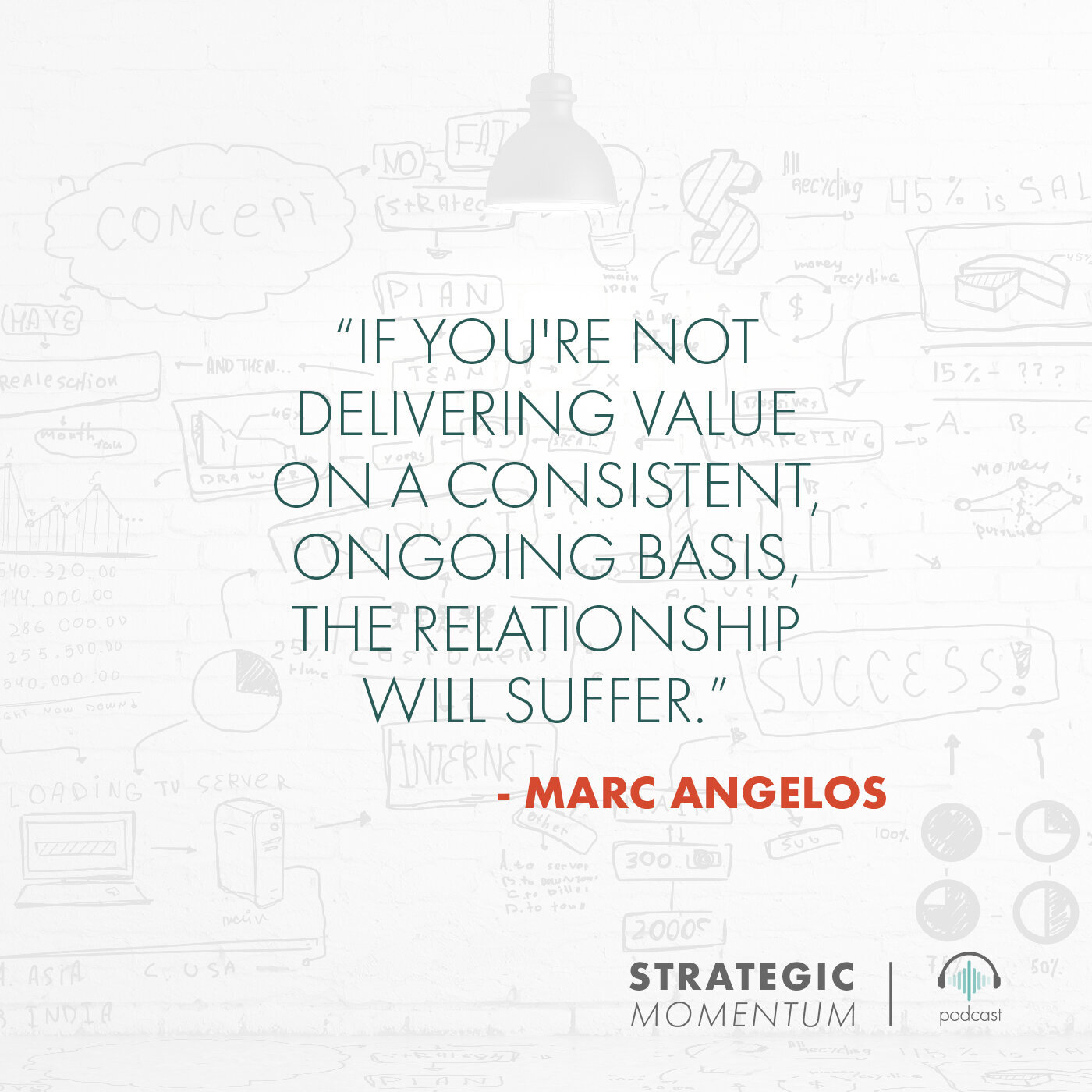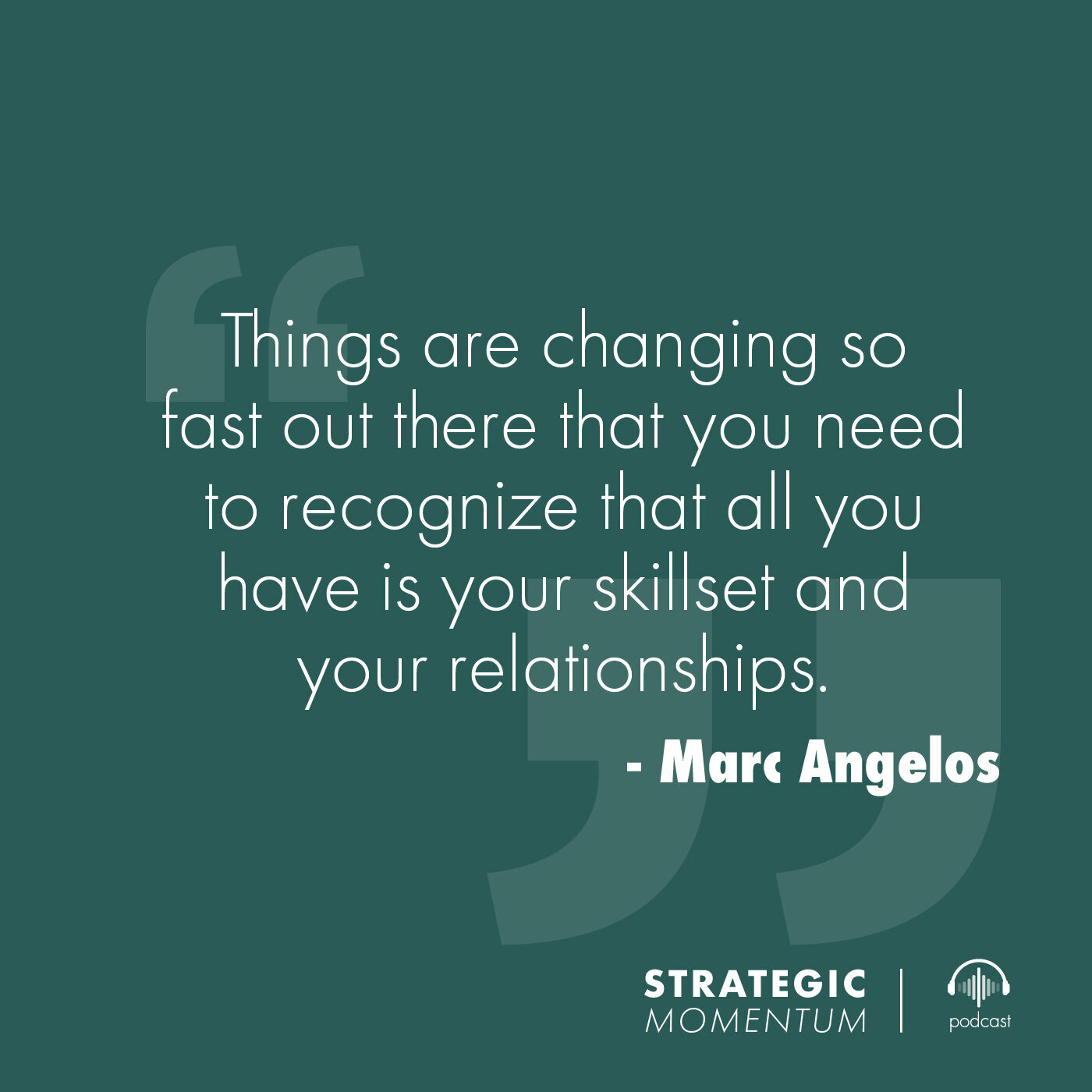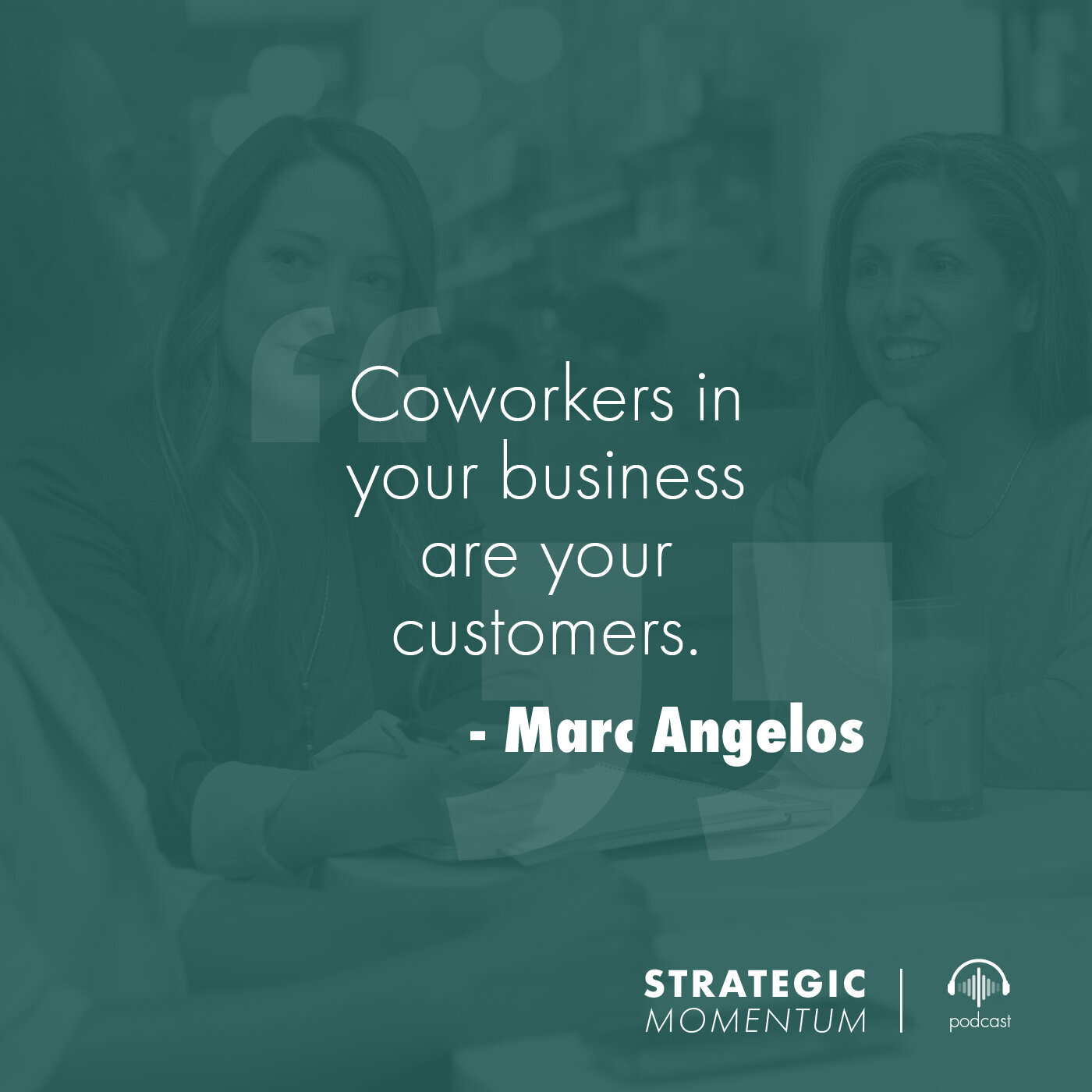Ep. 79 - Relationship Management: Building Rapport and Real Connections in a Virtual World - with Marc Angelos
Find Us Wherever You Listen To Podcasts
In the midst of widespread isolation, physical distancing, and global stress and anxiety, fostering human connection is more important in this COVID world than ever before; we all have the innate need to create a social rapport with others.
Even before the pandemic, the desire for real relationships in business and the workplace had given way to a trend towards transactional relationships — and that trend is only picking up pace.
Marc Angelos is a relationship manager and former Wall Street trader who has made communication and relationship-building his primary focus. A self-described “people person,” Marc has always used his ability to truly connect with people and build trust to help him navigate the sales process in the finance industry. He’s spent the last 25 years managing senior business relationships on Wall Street, which have taken him around the world and back. In his time, Marc has authored more than 100 articles on connecting with business customers, and his writings have been featured in outlets such as Bloomberg and Traders Magazine.
Presently, Marc helps professionals break down the barriers keeping them from developing meaningful relationships inside and outside of work through his communications firm Anvictus. In this episode, he offers advice for networking in the COVID climate and how you can cut through the digital noise, shares how to avoid the most common virtual networking mistakes, and helps us build meaningful connections through trust, transparency, vulnerability and authenticity.
In this episode, you’ll learn:
What people are getting wrong when it comes to establishing relationships in today’s virtual world.
What delivering value for your customers (which includes your co-workers) really means and how to do it
Advice on how to really build rapport, demonstrate authenticity, and overcome barriers to foster a real relationship
From Media to the Trading Floor to Communications
Even before entering the world of sales and trading, Marc learned the importance of understanding and connecting with your audience. In college, he was the frontman in a rock band, which taught him a valuable lesson about relationship management:
“The hardest part about being in the band was not learning 80 songs. It wasn't even learning five songs in a day when you had short notice for a competition. It was reading the room while you were playing to adjust on the fly to what worked and what didn't work with that crowd.”
He brought that lesson with him as he started his career in business, working for media companies including HBO and Polygram Records. Not long after, he worked his way into finance, where he found the trading floor to be “corporate enough without being that corporate environment.” Marc spent more than 20 years at several major brokerage firms, such as Morgan Stanley, Barclays Capital, and UBS.
Although he spent most of his time in the finance industry, he knew the value of constantly taking on new roles in different companies as it enabled him to uplevel his skills and take on new challenges. And it’s because of the deep connections he built within the firms he worked at, as well as clients and even competitors, that he was able to seek out and be sought after for new opportunities.
Throughout his career, he’s learned that being a relationship manager is just like being in a rock band: it comes down to connecting with your audience. And he realized early that it wasn’t the technology he was selling that customers were drawn to. Rather, it was the human element on top of it all was what made the difference. So he focused on becoming the people person in a world of technology.
Today’s World: Transactional vs. Relational, Breadth vs. Depth
It seems that we now live in a transactional world; the primary goal of the game is to add another connection quickly or figure out what value you can extract from another person to get what you want, not what the other person may need.
“There has to be value and there has to be someone who recognizes that you're being authentic in that delivery attempt,” says Marc. “That's where I think that folks go wrong. It's either they don't take the time to build that rapport first or they cut right to the whole, ‘This is what I can do for you. And this is what I need from you.’ And there's that transactional feel.”
Marc shares that the lack of building that true rapport in today’s hybrid digital and world comes from the pressure to measure the business impact of those connections: the more people you reach out to, the more hits you theoretically should get, and the faster you will hit your intended outcomes.
Yet conversations where you are working to build that bridge with someone don’t immediately end in some measurable action, like a sale. But they are not void of value. It’s about the long game; it’s creating that village of people who you can help and eventually may be in a position to help you too.
Building Rapport = Building Trust and Creating Value Based on What the Customer, Client, Co-Worker Sees as Value
Understanding and mastering the value exchange is a critical part of relationship development, and it’s something we talked about with respect to business development with John Keeling way back in episode 25. The key is letting go of the me-first mentality and removing the word “I” from your messages. Be brief, be bright, be gone, as Marc says. Or be personal, useful, and brief, as Erin Gargan King told us in episode 40. It’s about putting the other person’s needs and wants first, even if there is nothing in it for you.
But before you enter the conversation, know what value you intend to deliver to them because, if it’s the other way around, it’s a non-starter. Think of it like the baker’s dozen, that extra something you can give that makes your customers want to come back. Sometimes that value isn’t a product or service, but rather information or expertise — what Marc calls “intangibles.” It’s offering something that will help them in the long-term personally or professionally.
This also helps establish trust, which is critical to relationship development. In hard or uncertain times, you want to be the person that others can count on and be top of mind.
What it really all comes down to is being helpful, authentic, and delivering value in whatever form you can. And remember that to do so requires preparation; learn about who your audience is and what needs they have, as well as potential solutions you can offer which may or may not be even related to what you do or sell.
At the end of the day, we’re all human and humans need connection. So when we’re faced with challenges like having to transfer face-to-face interactions to digital ones, we have to be willing to test, learn, and adapt to figure out if what you deliver provides the most value to your customers and co-workers in the best way to maintain business and career momentum. Because relationships are capital, and in the business of work, they’re more valuable than hard skills.
Career Advice
Embrace who you are as early as possible. “Go back to when you were 10 years old: what kind of person you are, what you liked, what you wanted to do when you grew up all that bit. Some version of that is what everyone's going to now.” If you’re in the midst of a pivot, reconnecting with who you are underneath can guide your next move.
Key Takeaways
With everything changing so quickly, recognize that all you have is your skillset and your relationships; consider how the road bends because you’re not going to see all the curves.
The level and depth of your connections (versus the width or quantity) is what's going to determine your success.
Creating value is the tenet in terms of developing tighter business rapport with your competitor, clients, or whomever you want to build relationships with.
“If you're not delivering them value on a consistent, ongoing basis, the relationship will suffer.”
You don't get to decide what is considered valuable for others. People have what’s valuable to them and your job is to know what that is.
That starts with doing your research of which you can get what you need online.
For those in a sales capacity, realize that value you should deliver may not be the product or service that you have to sell. Rather it might be information related to their business, competitors or even the market that could be helpful.
Be an advisor/consultant for your coworkers not just your customers. Treat them like friends because your co-workers are also your customers no matter where they are in terms of location or in your organization.
Think constantly about what you can be doing for them. People will remember when you reached out that one time when it really counted.
Realize that your co-workers can eventually become your bosses or even employees. So thinking about building relationships with them for the long-term is key.
In virtual communications, remember: be brief, be bright, be gone.
In a cold reachout, once you've contextualized who you are, tell them why you matter to them in terms of their world and the problems that they have, and then thank them for their time.
Remove yourself from conversations as much as possible. Focus on “you” and “we” over “me” and “I.”
“At the end of the day, it's about a value exchange. If I've brought you value, you'll bring me the connection I'm seeking with you. But if I'm just looking for connection and there's no value trade, you're not interested in that.”
For a longer conversation, the majority of it should be spent connecting personally — life, home, ideas. That’s how you build rapport. Use the final few minutes to conduct the business you’re there to do.
A major part of building trust is reliability. In these uncertain times, businesses are falling back on partners and vendors who they know they can count on. And it's the same within your business.
You can strengthen your relationships with coworkers by proving your reliability; be the one your peers can count on.
Consistency is also key. You never know what lies ahead but if you’ve been the person that has viewed everyone as their valuable customer then your relationships won’t be seen or interpreted as transactional. And that always starts with asking how you can help with no expectation of anything in return.
Leverage your thought leadership as a way to connect with people. Use LinkedIn to publish articles on topics you can contribute value to.
“Once [your targets] understand you're a subject matter expert or they know what you know what you're talking about, they're interested in your thoughts as it pertains to them.”
Being authentic means being honest to a fault and being comfortable being in your own skin. You will not appeal to all people and that’s okay. Do not apologize for who you are. This is why you find people who you do appeal to and focus on establishing relationships with them.
When dealing with fear or anxiety when meeting new people virtually, the best thing to do is be honest and transparent.
Break the ice by saying you feel nervous or uncomfortable, but then use your value offer to guide the conversation. Remember that you’re there to deliver value — ask how you can help them as well.













